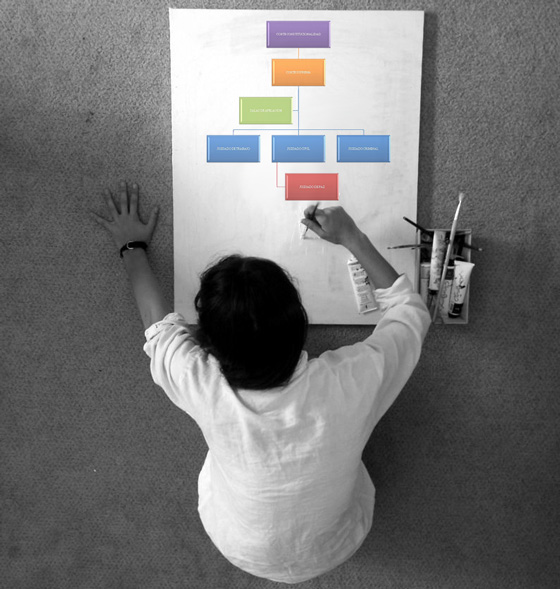A skill that is essential to good training, and that is emphasised on our Train the Trainer course, is the ability to ask the right kinds of questions in order to best challenge and get the most from delegates.
Since Socrates' time, questioning has been taken to be an effective method for all sorts of teaching as it gives the student the opportunity to ruminate and run over information in their mind as they answer.
Questioning is also a very effective way to deal with difficult delegates, when used as part of a broader strategy.

We thought it would be a good idea to explain some of the different varieties of questions that can be used in training with some examples of how they can be used:
Leading Questions
Leading questions are particularly important in training. The idea is to ask a question that has the under-surface intention of bringing someone around to your point of view.
These can be particular useful in a disagreement with a delegate when you know you're right (although have the potential to backfire if you're wrong!). Used well and they can be a powerful tool, but used badly and it can make you seem manipulative; so use with care.
Andy Trainer
22 Mar 2013
A skill that is essential to good training, and that is emphasised on our Train the Trainer course, is the ability to ask the right kinds of questions in order to best challenge and get the most from delegates.
Since Socrates' time, questioning has been taken to be an effective method for all sorts of teaching as it gives the student the opportunity to ruminate and run over information in their mind as they answer.
Questioning is also a very effective way to deal with difficult delegates, when used as part of a broader strategy.

We thought it would be a good idea to explain some of the different varieties of questions that can be used in training with some examples of how they can be used:
Leading Questions
Leading questions are particularly important in training. The idea is to ask a question that has the under-surface intention of bringing someone around to your point of view.
These can be particular useful in a disagreement with a delegate when you know you're right (although have the potential to backfire if you're wrong!). Used well and they can be a powerful tool, but used badly and it can make you seem manipulative; so use with care.
Andy Trainer
22 Mar 2013
Basic planning is essential to the development and growth of any business, but knowing how to plan well is a skill in and of itself. A masterpiece can't be made without careful consideration of the tools available, the methods to be employed and the end-target.
No one knows this fact more than a project manager upon whose plans rest entire company endeavours, as we explained in our analysis of the PRINCE2 Planning Theme.

There's a time and a place for spontaneity (ironically) but when it comes to the successful completion of a project, planning is fundamental, which is why it is such a pivotal part of our PRINCE2 Project Management Courses.
So just why is planning so important, especially when project management is concerned? How do you go about it, and within a project, who is responsible for planning what?
Why So Important?
Let's make it clear - when I'm referring to a plan here, I'm not specifically (or necessarily) referring to a formal document associated with any of the major project management methodologies. Instead, I am referring to the general 'concept' of planning but with specific reference to project management.
As such, we'll take a look at the more formal aspects of planning an actual project but also look at the more general planning that can be applied to both projects and other aspects of life.
Firstly with regards to projects, let's take a look at why planning is so important for:

Team Members
Psychologically speaking, forward planning makes a huge impact on a worker because it clearly sets out the criteria they must meet in order to be deemed successful. Having that clear set of criteria in mind gives them something to aim toward.
This in turn breeds greater focus and drive and enhances productivity because they are able to see themselves develop step-by-step, identify 'wins' and failures and pinpoint their value within a project.
Andy Trainer
5 Mar 2013
Music is widely recognised as an effective teaching aid for young children but is often dismissed as a 'novelty' technique when talking about the development and training of adults. In fact, music is useful as an educational tool for all ages for a wide variety of reasons.
In this post I'm going to look at why music can be such a great method to help with training and give examples as to how you can integrate it into your sessions.

For maximum impact, music should be used alongside questioning techniques and even Neuro-Linguistic Programming techniques; both of which can be learnt on our Train the Trainer Course.
Mood Setting
Music is strangely powerful when it comes to creating a mood, for individuals and groups alike. With that in mind, you can use it to your advantage in training sessions. It's worth having a bank of varied music stored on your laptop or phone or a subscription to a music streaming service like Spotify (and don't forget external speakers!).
From invoking a sense of concentration with some Mozart or Bach (or whichever 'classical' composer works for you) to garnering some enthusiasm with some upbeat, even motivational music (Eye of the Tiger anyone?) - used in the right way it can make training sessions a more pleasant and balanced experience for everyone, especially if you have difficult delegates on the course.
Andy Trainer
21 Feb 2013
Music is widely recognised as an effective teaching aid for young children but is often dismissed as a 'novelty' technique when talking about the development and training of adults. In fact, music is useful as an educational tool for all ages for a wide variety of reasons.
In this post I'm going to look at why music can be such a great method to help with training and give examples as to how you can integrate it into your sessions.

For maximum impact, music should be used alongside questioning techniques and even Neuro-Linguistic Programming techniques; both of which can be learnt on our Train the Trainer Course.
Mood Setting
Music is strangely powerful when it comes to creating a mood, for individuals and groups alike. With that in mind, you can use it to your advantage in training sessions. It's worth having a bank of varied music stored on your laptop or phone or a subscription to a music streaming service like Spotify (and don't forget external speakers!).
From invoking a sense of concentration with some Mozart or Bach (or whichever 'classical' composer works for you) to garnering some enthusiasm with some upbeat, even motivational music (Eye of the Tiger anyone?) - used in the right way it can make training sessions a more pleasant and balanced experience for everyone, especially if you have difficult delegates on the course.
Andy Trainer
21 Feb 2013
Within the Directing a Project (DP) stage of PRINCE2®, authorising a project is a particularly important process.
Without it, the next stage plan cannot be approved which means that the project cannot proceed.
In this post we'll take a look in more detail at why it is a necessary process, who is responsible for each aspect and how it should be carried out.
If you'd like to find out more about PRINCE2 processes like authorising a project, try our PRINCE2 Courses.
Why is it Needed?
By using this process it means that the project board can make sure that there is:
- An acceptable Business Case in place (read 'What is a Business Case?' for more details)
- The goals and methods of the project match that of the corporate strategy
- An acceptable set of tolerances (and scope) has been set
- Risks are accepted and outlined fully
- The right controls have been set

Andy Trainer
4 Feb 2013
The outsourcing of IT and other services is now common practise. Problems can arise when it is seen as a means to pass on responsibility for service management or IT service management.

Image -'Service' by SaschaKohlmann
There are a significant number of problems for which the application of ITIL disciplines can bring substantial benefits. All of which are covered in the ITIL Foundation course.
As with many technical subjects, a little storytelling makes concepts easier to understand, so we asked our expert John A.G. Smith takes a lighter look at the subject of ITIL Contracts, Services and Agreements.
John A G Smith
8 Jun 2016
How many times have you heard your customer complain that the product you have delivered doesn't meet their expectations?
This is as a result of not addressing their expectations early enough in the project to get it right. You can learn how to do this with 5-day PRINCE2 Practitioner Training.
But customers also bring problems too! They often don’t seem to know what they want.
It is your job as a project manager to work with your customer to establish their quality expectations and then to create some measurable criteria against which you can deliver something fit for purpose.

Where Do We Start?
At the beginning... of the project.
During the early stages of the project – Starting Up – you should be talking to your customer about the solution:
- What they hope it will do
- How it will work
- What it will look like
These initial expectations will be little vague and may require some prompting and input from you to gain clarity around what the expectations mean.
Andy Trainer
31 Jan 2013